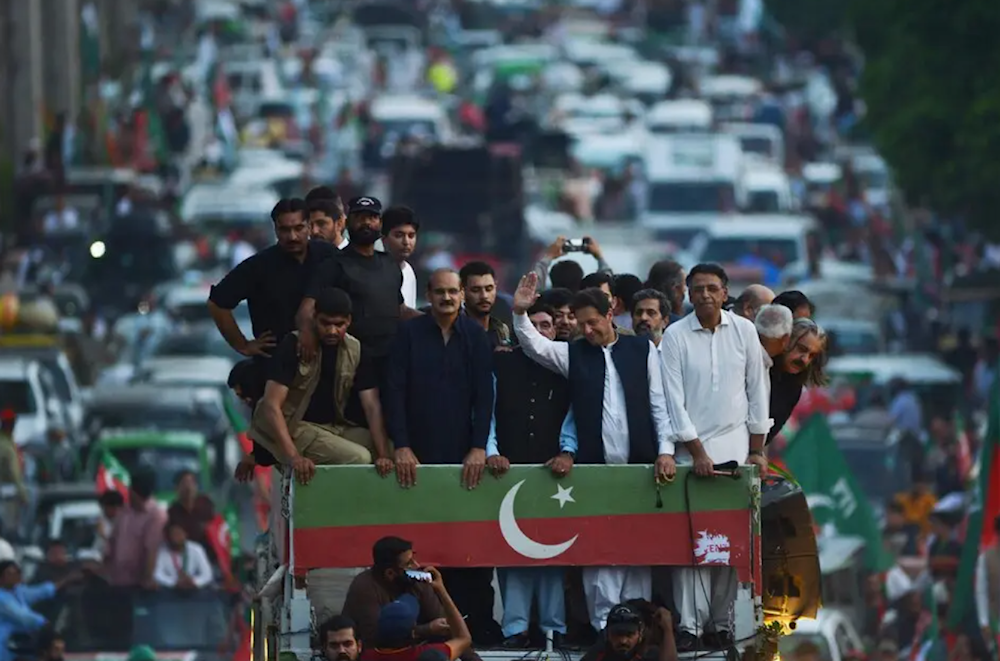Imran Khan's party wins reserved seats in Pakistan's parliament
After being forbidden from participating in the election, Khan's Pakistan Tehreek-e-Insaf (PTI) candidates ran as independents on February 8.
-

Former Prime Minister Imran Khan waves to supporters during a protest rally against inflation in Punjab Province in August 2022. (AFP)
Pakistan's Supreme Court declared on Friday that incarcerated former Prime Minister Imran Khan's party was eligible for at least 20 more reserved seats in parliament, increasing pressure on the country's fragile coalition government.
After being forbidden from participating in the election, Khan's Pakistan Tehreek-e-Insaf (PTI) candidates ran as independents on February 8. Although they gained the most seats, the election commission ruled that independents were ineligible for the grant of 70 reserved seats, meant for political parties only.
The commission had ordered that the reserved seats be given to other parties, notably those in the ruling coalition.
Chief Justice Qazi Faez Isa declared that the PTI was "entitled to its reserved seats" when reading the ruling, backed by eight justices and opposed by five of the 13-member full court bench.
According to Law Minister Azam Nazeer Tarar, the decision to give 23 reserved seats does not affect Prime Minister Shehbaz Sharif's coalition government's legislative majority.
The ruling coalition retains far over 200 seats in the lower chamber of parliament, which has 336 members. Khan's party strength was 84 before the decision, and it is anticipated to climb to more than 100.
Under Pakistan's election regulations, parties are assigned 70 reserved seats - 60 for women and 10 for non-Muslims - in proportion to the number of seats they win.
The judgment strengthened Khan's political position, with supporters claiming that the election commission and a pro-military caretaker administration that oversaw the polls engaged in electoral fraud to deny him victory.
The commission and military dispute the claims, but the West has questioned the polls' openness.
PTI chairman Gohar Khan stated that "we were robbed of our right," adding that the party that some wished to see eliminated was brought back to life.
According to Ahmed Bilal Mehboob, head of the Pakistan Institute of Legislative Development and Transparency think tank, the sentence essentially denies the ruling coalition its desired two-thirds majority.
"It will boost the morale of PTI workers and they may be in a better position to launch a movement if the party so decides," according to him.
Imran Khan's graft verdict suspended due to 'lack of evidence'
In April, Reuters reported that a Pakistani court granted convicted former prime minister Imran Khan permission to appeal against the court's graft decision, a political corruption for personal gain charge, and suspended his 14-year sentence, his lawyer said.
Imran Khan and his wife Bushra Bibi were sentenced to 14 years in jail in the Toshakhana case. The National Accountability Bureau (NAB) filed a new reference against them, accusing them of "retaining a jewelry set received from the Saudi Crown Prince at an undervalued assessment."
The verdict, delivered just eight days before the February 8 general elections, added to the challenges facing the Pakistan Tehreek-e-Insaf (PTI) party amid a state crackdown and the absence of an electoral symbol. This came just one day following another sentencing of Imran Khan and former Foreign Minister Shah Mehmood Qureshi to 10 years in prison for allegedly "disclosing state secrets."

 3 Min Read
3 Min Read








